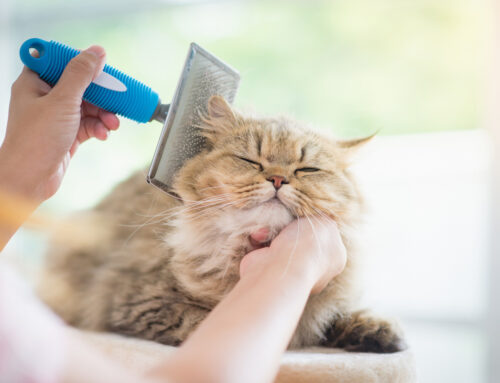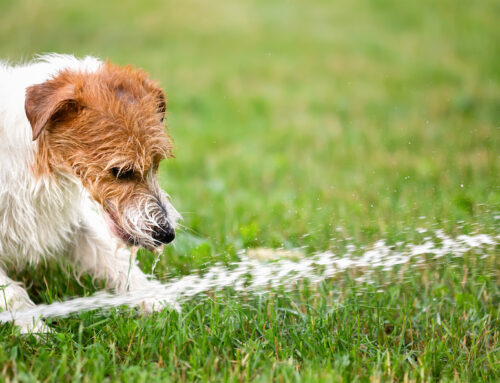Here in Georgia, flea and tick season is a year-round event. But something about the steaming summer sun makes flea and tick season seem even more miserable, especially when pets are suffering from bites.
The good news is that there are ways to prevent fleas and ticks not only during the summer but all year long. This survival guide will show you how to prevent fleas and ticks from biting your pets, as well as getting rid of fleas if they invade your home.
The Dangers of Fleas and Ticks
First, we must stress that flea and tick prevention is critically important. While an itchy dog or cat will feel miserable, you must also consider the health consequences of flea or tick bites.
Flea and Tick-Borne Illnesses
What diseases do fleas and ticks carry? Unfortunately, there are a number of diseases that these insects can spread to both pets and humans. According to the CDC, these are several diseases brought upon by fleas:
- Plague: Yes, this is the plague. The plague was responsible for mass death and devastation during the mid-1300s. Luckily, this isn’t as much of a worry since there are antibiotics that can help humans recover. However, the plague affects both people and pets. Cases of the plague still continue to occur in rural areas of the US.
- Cat scratch disease: This is a disease spread by cats that typically have fleas. Humans can experience symptoms such as fever and headaches.
- Fleaborne parasites: This is more prevalent in children who play on flooring and carpet. If an infected flea is accidentally swallowed, it may result in tapeworm.
But what about tickborne illnesses?
Tickborne illness can also wreak havoc on the health of both people and pets. Unfortunately, there is a myriad of them.
Some of the tickborne illnesses include:
- Rocky Mountain spotted fever
- Colorado tick fever
- Bourbon virus
- Lyme disease
- Heartland virus
- Tularemia
Monthly flea and tick control is a must during the summer months in Georgia, as well as the rest of the year. This is to prevent this array of illnesses from spreading to pets and humans alike.
Summer Flea and Tick Season Prevention Options
When it comes to flea and tick prevention, there are a variety of options available for cats and dogs. You’ll find a range of prices, but you’ll need to choose the right product carefully.
Flea and tick prevention can be applied to your dog or cat in a number of ways, including:
– Wipes
– Dips
– Foggers
– Shampoos
– Oral medication
– Collars
Some of these applications are designed to kill fleas at different cycles during the summer flea and tick season, such as egg or adult fleas. There are also some options that will remove all cycles of fleas.
The most effective approach is to remove all flea cycles. If only one is removed, the other cycle can still survive and reproduce. Unfortunately, fleas and ticks are very resilient creatures and it can be incredibly difficult to get rid of them once they get inside your home.
When you’re in doubt about the type of flea and tick medication that’s right for your pet, it’s best to talk with a veterinarian. Be aware that flea medications can cause side effects, including seizures. If your pet experiences side effects, contact your veterinarian immediately.

Comforting a Pet with Flea Bites
Flea bites can turn skin red, making it irritable and painful for pets.
You can give your pooch a cool bath with a fragrance-free shampoo, which helps reduce inflammation. Vet’s Best Flea Itch Relief Shampoo and Tropiclean Flea and Tick bite are two popular options.
Another option is to choose a pet shampoo with oat proteins, aloe, or tea tree oil.
The key is to allow the shampoo to have contact with the skin for 10 minutes before washing it off.
How to Handle Summer Flea and Tick Season Infestations
Flea infestations are physically and emotionally taxing. While fleas will first feast on your pets, they will eventually bite you next when they’re looking for a new food source. Itching is a telltale sign of an infestation.
It’s possible to get rid of flea infestations, but know that it can take time. One of the largest hurdles is breaking the flea cycle, where the flea goes from egg, larva, pupa, and the final adult stage. All stages must be extermined for the infestation to end.
- The first step is to use a powerful vacuum. Vacuum all nooks and crannies of your home. If you have hardwood floors, make sure you vacuum the gaps between the floorboards as this is a place where fleas like to hide. Vacuum inside of heating vents and registers as well.
- Carpet and upholstery should be steam cleaned, including pet beds. If the infestation is severe, it’s best to destroy and discard the pet bed and purchase a new one.
- Wash your own bedding, using the highest heat setting on the dryer.
- Take to chemical treatments. This may be the only real remedy to rid your home of fleas for good. You’ll want to choose a treatment that contains adulticide and an insect growth regular. This will help kill off all stages of fleas
- Aerosole sprays allow you to spray directly into areas such as under beds and inside small spaces. Foggers will cover the room, but you can’t be certain that every area is contacted unless you are applying it directly via aerosol.
If your efforts fail, extermination is also an option. You’ll have to leave your home while getting your pets out of the house as well. The exterminator will treat the home and you can return within several hours. Your house may have a temporary strange smell, but by the time you arrive home, it will be dry and safe to be there.
Keep in mind that some exterminators have a guarantee to rid of fleas within one visit. If they aren’t successful, they might come back for free with another treatment. Be sure to clarify this with your exterminator before they arrive at your home.
Other Prevention Measures of Tick Bites
Tick prevention medication can ward ticks away from your pet. However, it’s best to take as many precautions as possible when preventing bites, which is also helpful to humans.
Where to Expect Ticks
When you’re venturing outside, be mindful if you’re potentially entering a tick-infested area. Ticks are found in wooded areas, especially if there is a lot of tall grass or leaf litter. You can also find ticks in your own backyard.
If you plan to go camping, hiking, or spend time in a woodsy area, treat your clothes. You’ll want to use products that contain 0.5% permethrin. It can be used on items such as boots, clothing, and camping gear. Do not apply this to pets, but be sure they receive their monthly flea and tick treatment before venturing out.
Generally, you’ll want to avoid wooded areas with high grass or leaf litter. If you choose to take a walk outside on an untreated path, try to stick to the center of the trail.
When you come inside, there is also a process for preventing ticks or catching them quickly for removal.
Once you are back at home, be sure to do a full body check. Check all your clothing, including shoes. Check your hair (especially if it’s long), ears, and scalp. Inspect your hands, particularly your fingernails. Check your children for ticks as well.
You’ll also want to check your pets carefully if they joined you outside, especially on a camping trip or hike through the woods.
For your pets, check in areas including the belly, groin, ears, and armpits. Ticks like to hide in these areas.
How to Remove a Tick
What happens if you find a tick on yourself or your pet? First, don’t panic. It can be alarming to find a tick in the process of burying itself into the skin, but there are safe ways to remove them.
The CDC outlines the most effective way to remove a tick:
- Find a pair of fine-tipped tweezers
- Grasp the tick as close to the skin’s surface as possible. This is because the head is buried under the skin, and you’ll need to be careful to not break the head off while it’s still in the skin
- Once you have a hold of the tick, pull the tweezers upward with a steady pressure
- It’s important to remain consistent with pressure so the ticks head doesn’t break off.
- Refrain from making twisting or jerking motions.
- If you are unable to remove the mouth and head, leave it alone and allow the skin to heal
- Once you are done, thoroughly wash the skin where the tick was located
Get a Handle on Flea and Tick Season in Georgia
If you need help or have questions about fleas and ticks, this season, Animal Care Center is here to help. Our knowledgeable staff is experienced with handling flea and tick bites, as well as helping to provide relief for your furry friend. Please contact us today to schedule an appointment.






